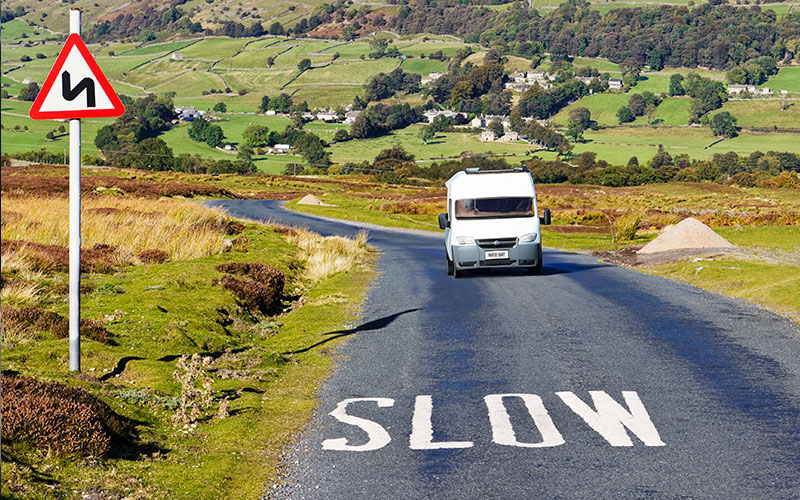Road Safety Tips for Van Drivers

Table of Contents
2. The history of Road Safety Week
3. Tips to improve road safety as a van driver
4. How to participate as a van driver in Road Safety Week
What is Road Safety Week?
Road Safety Week is an annual week-long event to raise awareness of safe mobility. This year, Road Safety Week 2023 will be taking place from 19th – 25th November.
Each year a theme is chosen for the campaign, focusing on one area of road safety. This year’s theme is centered around ‘Let's talk about speed’. The campaign aims to educate drivers, communities, and businesses on the importance of speed.
History of Road Safety Week
Road Safety Week was introduced by road safety charity Brake in 1997.
Founded in 1995, the charity offers support to people who have experienced bereavement from a road traffic accident. The charity also helps anybody involved in an accident, including staff from emergency services.
Brake runs community projects and national campaigns in addition to Road Safety Week. They also offer a free support service – The National Road Victim Service.
Tips to improve road safety as a van driver
Driving fatigue
Fatigue when driving is one of the main causes of UK road crashes. It’s estimated that 10-20% of all crashes are caused by driver fatigue. Astonishingly, one in eight drivers have admitted to falling asleep behind the wheel.
That’s why it’s so important to recognise the warning signs, before it’s too late. If you are driving your van for long periods of time, it’s vital to take regular breaks. For periods of six hours or more of driving, it’s recommended that you take a 15-minute break every hour.
Signs of driving fatigue include:
- Difficulty concentrating
- Yawning
- Water
- Heaviness in the eyes, or feeling like you are starting to drop off
If you experience any of these signs, it’s important to pull over in a safe place as soon as possible.
Did you know that if you fall asleep behind the wheel at 70mph, you could travel up to 200 metres without realising?
To decrease the likelihood of driver fatigue, make sure you are getting at least eight hours of sleep and take regular breaks.
Some vans can detect the signs of fatigue and prevent accidents. Systems can track wheel and lane movements, alerting the driver when there could be an issue.
Van maintenance
Regular van maintenance is one of the major factors of road safety. If your tyres are underinflated, or your brakes aren’t working properly – you put yourself at risk of an accident.
It’s important to regularly check key elements of your van to keep yourself and other road users safe.
You should regularly check:
Van tyres – inspect the tread depth and check the pressure of your tyres. If your tyre pressure is too low, the handling of your van can be impacted and put your tyres at risk of wear and tear. Also, keep an eye out for any cuts or bulges in your van’s tyres.
Van lights - this is a simple check that should be carried out before every journey in your van. Switch on your lights and take a walk around your van to make sure everything is in working order. It’s also important to ensure they are clean. A telling tail sign of failing lights is flickering.
Van Brake pads - most vans will warn you if your brake pads need replacing. But it’s also important to be vigilant. At least 3mm of the brake pads should be visible. If not, it’s important to quickly get a second opinion. If you also hear a loud noise or grinding noise when braking, it may be time to get them replaced.
Van fluids - brake fluid is key to braking safely and quickly. The fluid is activated after you press the brake and acts as a lubricant to stop corrosion. Warning signs that indicate you brake fluid needs changing include:
- An illuminated brake or ABS warning light on the dashboard
- More pressure is needed when using the brake pedal
- Needing extra time to brake
- A spongey feeling when pressing the brake
At Vansdirect, we offer a van servicing and maintenance package to help keep your van running smoothly and safely. The package includes:
- 24-hour assistance / driver helpline
- Van servicing, maintenance and repair (SMR)
- Van MOT testing
- Accident management
- Van breakdown assistance, including home start
- Tyre replacements, fair wear and tear and punctures
- Warranty claim bookings
- 16,000 approved garages across the UK
- Free van collection and delivery on day of van service, subject to availability
- Free courtesy car, on day of van service, subject to availability
Van speed limits and driving habits
A lot of people might not be aware that vans can be subject to lower speed limits than cars on certain roads.
If you are travelling on a single or dual carriageway, the speed limit is 10mph less than cars. Always remember that the speed limit is the maximum speed you can travel at – even a few mph over can lead to speeding offences or an accident.
Get into the habit of practicing safer driving habits including:
Take your time – life is busy and running late happens. But it’s vital to not go over the speed limit to reach your destination quicker.
Utilise sat navs – most navigation systems will alert you before a change in speed limit. So always be prepared in case the limit changes.
Don’t pressure other road users – if you find yourself stuck behind a slower car, don’t pressure them into exceeding the speed limit.
Maintain a safe distance – always leave plenty of space between your van and any vehicles in front. Not only will it help you maintain a steady speed, but also gives you more time to act should you need to accelerate and decelerate.
Van Load management
It’s important to safely and securely load your van to prevent any accidents. Any unsecured cargo can move around in transit and cause your van to roll or shift forward when braking. This in turn could put yourself and any passengers at risk of an accident.
Tips for safely and securely loading your van include:
Loading larger items first – by loading your van with bigger items first, you can then fit smaller items around them. This will allow you to efficiently maximise space in your van. It’s also important to evenly distribute heavier items across your van’s load space.
Evenly distribute your van load – make sure to load items from the back to the front of your van in rows. To stop any smaller items from moving around, always utilise the space. It’s also vital to not exceed your van’s load capacity. Overloading your van is illegal and could lead to a fixed penalty notice and a dangerous driving charge.
Secure your van load – it's important to secure your van’s load to prevent any accidents. Items can move around on the road, so it’s vital to use webbing or lashing straps to keep them in place. A van bulkhead or divider is also a great way to prevent any items from moving into the cabin from the cargo space.
Secure your van load – it's important to secure your van’s load to prevent any accidents. Items can move around on the road, so it’s vital to use webbing or lashing straps to keep them in place. A van bulkhead or divider is also a great way to prevent any items from moving into the cabin from the cargo space.
Pedestrian and cyclist safety
The Highway Code was updated in 2022 in order to protect those most at risk on the road.
Changes were made around pedestrians and cyclists, including a hierarchy of road users. This sets out who is most at risk of a road traffic accident. It’s not surprising that pedestrians and cyclists are at the top of the hierarchy.
If you are travelling through an urban area, always be aware of any upcoming zebra crossings. If a pedestrian is at the crossing or about to walk on the crossing – you must give way.
Also, remember to maintain a safe distance between your van and any cyclists. If it is safe to travel around them, give them plenty of room and always signal to set your intentions.
When your van is parked, it’s also vital to be aware of your surroundings. Always check around you before opening any doors and have a look in your blind spot before pulling away.
Many new vans now offer cyclist and pedestrian detection, so you don’t have to second guess yourself.

Weather awareness
As winter weather draws in, it’s important to adjust your driving habits to suit. Snow, fog, ice, heavy rain and winds are just a few things you’ll face as a van driver.
Good winter driving habits include:
Increasing your stopping distance - the size of your van and load capacity will determine your stopping distance. But in winter, your van will take longer to come to a complete stop – especially in rain, snow, or ice. Always take this into consideration and leave plenty of room between you and other vehicles.
Be aware of your surroundings - tricky weather can make it harder to spot pedestrians and cyclists. If the weather is bad take your time, especially when driving your van through busier areas.
For more helpful tips, read our article on the van driver’s guide to winter driving.
How to participate as a van driver in Road Safety Week
There are plenty of ways you can participate as a van driver in Road Safety Week 2023. Put safe driving habits into practice and have conversations with fellow van drivers on the importance of speed.
Your business can also take part in fundraising activities to help support the vital work that Brake does. To find out how you can get involved and see what’s happening, follow #RoadSafetyWeek on social media.
